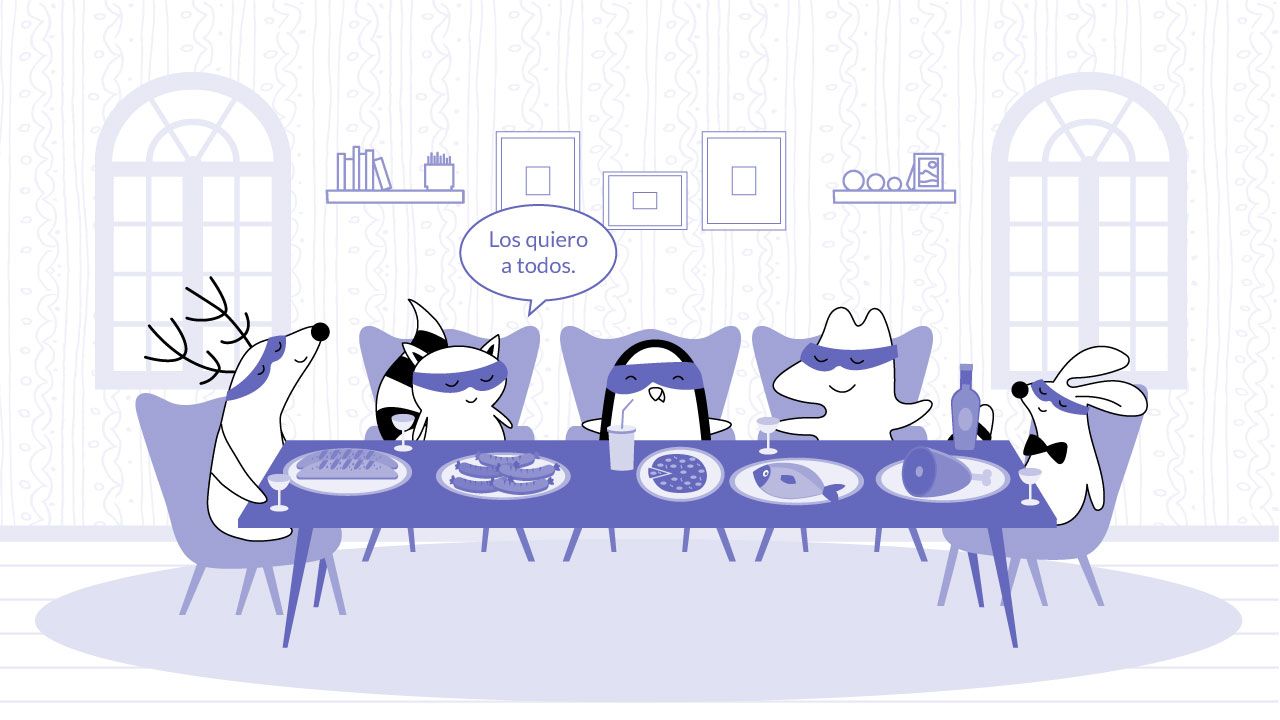
Sometimes, it can be difficult to find the right words to express your feelings even in your native language, and this is especially true when it comes to a grand declaration of your true love. However, don’t get discouraged just yet – fortunately, there are plenty of words and phrases for expressing love in the Spanish language.
Moreover, you can express your love in many different ways – from the traditional Te quiero to the more playful Te amo mucho – and each way has its own unique flavor. No matter how you say it, learning how to say "I love you" in Spanish is a great way to add some spice to your relationship.
So, if you want to learn how to say those three words to your partner, close friend, or family members in Spanish, keep reading. Below, you will find several sincere and passionate ways to say “I love you” in Spanish.
Te amo
This phrase is probably one of the first things that comes to mind when you think about saying “I love you” in Spanish. It is a very strong declaration, used by couples in a committed relationship who are deeply in love.
Native
Translation
Te amo
I love you
You can use this phrase with close friends or family members, as well as with your significant other. You can also back this phrase up by using some of the most common Spanish pet names. Some of the most popular include:
Native
Translation
Mi amor
My love
Mi cariño
My darling
Mi cielo
My heaven
Te quiero
Te quiero literally translates to “I want you” but it is a less passionate phrase in Spanish than its English counterpart and can be used in a more casual manner. Unlike English, this phrase is more appropriate as a way to express your affection towards someone you’re not in a romantic relationship with.
Native
Translation
Te quiero
I love you
Alternatively, you can say Te quiero mucho. This phrase is used to convey a deep feeling of love and affection. It is similar to Te amo, but by adding mucho, you make it a bit less formal and more intimate.
Native
Translation
Te quiero mucho
I love you so much
Te quiero is very informal, and it can be used in any situation. It is commonly used when you are talking about your feelings for your family members, friends, or colleagues. Moreover, the word te can be replaced with lo, which denotes that you love a place. This is a great example of how only a few words can be used to express different types of love.
Te adoro
Te adoro is a phrase that can be translated as “I adore you*.*” It is used to express deep love and affection.
Native
Translation
Te adoro
I adore you
This phrase is more intimate than Te quiero, and it is usually used to express a deep love for family members or by couples who have been together for a long time and are very comfortable with one another.
Me vuelves loco
This Spanish expression is a perfect way to describe a love so intense it makes you act foolishly or even recklessly. It’s most suitable for the early days of a relationship when you’re so in love you don’t even need to eat or sleep to stay awake and functioning.
Native
Translation
Me vuelves loco
You drive me crazy

Te necesito
The literal translation of this phrase is “I need you,” but it can also be translated as “I miss you.” This phrase is used to express a strong desire for something or someone.
Native
Translation
Te necesito
I need you
For example, if you are in a relationship with someone, it is common to use this phrase to say “I miss you” but also to express your desire for your partner.
Me caes bien
This is a very casual and playful way to say "I like you" in Spanish. You can literally translate it to “It falls well with me,” which doesn’t sound quite right, but the meaning is quite clear.
For instance, you can use this phrase at the end of a first date with someone you really enjoyed spending time with. Or, perhaps it’s early days, and you don’t want to rush things or scare them off by being too serious in your expressions.
Native
Translation
Me caes bien
I like you
Moreover, it is an excellent phrase for expressing your feelings to your friends or colleagues, as well as to anyone else who feels comfortable with such an informal expression of love in Spanish.

Eres mi vida
Eres mi vida is a very intimate way to say “I love you” in Spanish. It literally translates to “you are my life.” This phrase is used in a romantic sense and is often said by lovers. It is similar to Te amo, but can also be said to people you love deeply.
Native
Translation
Eres mi vida
You are my life
Alternatively, you can say La vida estaría vacía sin ti. This phrase means “Life would be empty without you,” and this is a very romantic way to express your feelings in Spanish.
Native
Translation
La vida estaría vacía sin ti
Life would be empty without you
Eres mi media naranja
This is actually a Spanish idiom that literally means “you’re my half orange.” It is a very cute and sweet way to say “I love you” to your soul mate, as “half orange” is used as the Spanish equivalent for “my other half” or “my better half.”
However, this phrase can be quite tricky to pronounce correctly, so take a look at the example with audio:
Native
Translation
Eres mi media naranja
You're my better half
Moreover, it is a great example of how romantic Spanish can be – especially when you’re talking about your feelings for someone special.

Este corazón es tuyo
The literal translation of this Spanish phrase is “This heart is yours,” and this is one of the most romantic things you can say to someone special. This phrase is very suitable to signify your readiness for serious relationships.
Native
Translation
Este corazón es tuyo
This heart is yours
Alternatively, you can say Mi corazón late por ti, which translates to “My heart beats for you.”
Native
Translation
Mi corazón late por ti
My heart beats for you
Te amo más hoy que ayer, pero menos que mañana
Finally, this is one of the most romantic and heartfelt expressions you can learn in Spanish to tell someone you love them wholeheartedly. It translates to “I love you more today than yesterday, but less than I'll love you tomorrow.” Here is how to say it in Spanish:
Native
Translation
Te amo más hoy que ayer, pero menos que mañana
I love you more today than yesterday, but less than I'll love you tomorrow.
If you want your other half to feel special or just melt in your arms, this is the perfect way to say “I love you” in Spanish.
The Bottom Line

Learning a new language can be a daunting task, so why not start this journey with something pleasant? Besides, learning Spanish phrases and idioms to say “I love you” is definitely something you can use on a daily basis to please your close friends and loved ones.
As you can see, there are many different expressions in Spanish to help you start speaking about your love. Whether you need a low-key phrase to show your interest after the first date or a grand declaration of eternal love, you’ll definitely find something suitable for your partner, friend, family member, or even colleague.
You should also download our Langster app to practice new vocabulary in context and learn Spanish with stories! Good luck!









